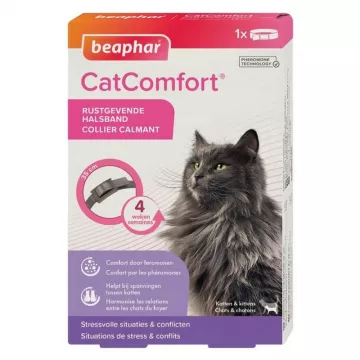
What types of collars are available for dogs and cats?
There are several types of collar to suit different needs and preferences. Standard collars are the most common and are suitable for everyday use. Training collars, also known as educational collars, include spiked or electric versions, designed to help train dogs. For cats, collars with identification tags and those equipped with anti-evasion devices are very popular. Choosing the right type will depend on your pet's intended use and behavior.
How do I choose the right collar size and material for my pet?
Collar size is crucial to your pet's comfort. An ideal collar should allow two fingers to slip between the collar and your pet's neck. As for materials, leather is prized for its durability and aesthetic appeal, while nylon offers a wide variety of colors and is easy to clean. For animals with sensitive skin, opt for hypoallergenic materials.
What safety features should I consider when buying a collar?
Safety is paramount. For dogs, a collar with a strong buckle and sturdy D-ring for attaching the leash is essential. For cats, collars with a quick-release safety system are recommended to prevent the risk of strangulation. In addition, make sure the collar is fitted with an ID tag where you can engrave your details in case your pet gets lost.
What are the benefits of reflective or luminous collars?
Reflective or luminous collars increase your pet's visibility during night-time walks, reducing the risk of accidents. They are particularly useful for pets moving around in poorly lit areas, or in adverse weather conditions.
How do I maintain my pet's collar to ensure its longevity?
Collar care is essential to guarantee its durability. For leather collars, use a leather conditioner to keep it supple. Nylon collars can often be machine-washed at low temperature. It is advisable to check your collar regularly for signs of wear and tear, and to replace it if necessary to ensure your pet's safety.
How important are adjustable collars for dogs and cats?
Adjustable collars are essential to ensure a perfect fit throughout your pet's growth. They allow for flexibility in size adjustment, which is particularly useful for fast-growing puppies and kittens. An adjustable collar ensures that the collar is neither too tight nor too loose, optimizing comfort and safety.
How do I choose a collar that suits my pet's lifestyle?
Choosing a collar should take into account your pet's lifestyle. For active dogs and those who spend a lot of time outdoors, a water-resistant, easy-to-clean collar is ideal. For pets who spend most of their time indoors, soft or decorative fabric collars may be preferable. Pets that swim frequently will benefit from collars made of materials that do not degrade with prolonged contact with water.
What are the advantages of smart collars for dogs and cats?
Smart collars offer a host of advanced features, such as GPS tracking, activity monitoring, and sometimes even vital signs measurement. These technologies enable owners to track their pet's location in real time, monitor activity levels and better understand their overall health. They represent an investment in your pet's safety and well-being.
Is it necessary to have a collar for my cat even if he always stays indoors?
Even for a cat who stays indoors, wearing a collar can be a valuable safety measure. A collar with identification can help find your cat if it accidentally escapes. What's more, it gets the cat used to wearing the collar, which can be beneficial when moving or traveling, where wearing a collar becomes necessary.
What are the recommendations for a dog collar when traveling or visiting the vet?
When traveling or visiting the vet, a collar with a complete identification tag is crucial. It's also advisable to use a collar that's comfortable and easy to remove, to facilitate management during security checks or medical examinations. For long-distance travel, consider a collar that can carry medical information or indications of your pet's specific conditions.